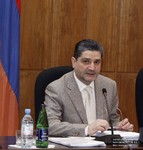Saturday, 13 February 2010
National Competitiveness Fund Board of Trustees met in session
The 14th session of National Competitiveness Fund Board of Trustees started with BOT chairman, Prime Minister Tigran Sargsyan’s opening remarks. The Prime Minister informed the council members on the results of his government’s anti-crisis program for 2009.
He noted in particular: “Signs of recovery could be noticed late last year. We were able to curb the recorded 18.4% economic fall and close the year with a 14.4% downturn, with the GDP rising to AMD 3 trillion 165 billion. As a whole, industry dropped by 7.8%, and what is impressing is that mining industry rose by 7.6%. 11.2% of the overall 14.4% downturn was due to shrinking construction caused by a 25% fall in the building sector which constituted about 30% of the GDP. At the same time, certain growth was recorded in metallurgy with a 20% rise in the production of Aluminum.
Tigran Sargsyan emphasized the 17% growth in the field of information technologies, caused the appearance of the third operator and a 12% increase in the number of sector entities. The Prime Minister said FY 2009 was particular in that retail trade and services rose by 1 and 1.3 percentage points respectively amid 14.4% economic downturn. A series of factors have brought about the mentioned 1% increase in retail trade. First of all, black economy has been reduced thanks to a massive use of cash registers. As a result, greater turnover was recorded in this area. A second reason is that the State has considerably increased public spending. In particular, pensions went up 16%, welfare benefits – 12%, inclusive of child allowances which rose to AMD 18,000 from 3000. Lump sum benefits for those families with three and more children were brought up to AMD 430,000 from 300,000. All this made it possible for us to close the year with 3000 more child births than in 2008. This higher birth rate was also due the reform of maternity assistance. Service quality was upgraded about threefold last year. A USAID-conducted survey revealed that corruption in this area has decreased to 20% from 80%.
The head of government predicted a 1.2% increase in the cost of budget-funded programs of 2010. Tigran Sargsyan advised that this January 5bn more revenue was collected as compared to the same period of 2008 exceeding the monthly target by AMD 2bn. This trend will be maintained during the month of February.
The Prime Minister noted that the government’s anti-crisis program will have greater impact during the second and third quarters of 2010. He further advised that the budget deficit-GDP ratio is supposed go down gradually under a medium-term program designed in cooperation with the IMF.
The meeting next discussed the results of the feasibility study carried out for the Center of Education and Research Project, the proposed merger of the Armenian Agency of Tourism Development and the National Competitiveness Fund, as well as the program of tourism development. Reference was made of the ongoing cooperation between the National Competitiveness Fund and the USAID.
The Board of Trustees further looked at the findings of a NCF-implemented study concerning the prospects of oncology development in Armenia, as well as the government’s decision to purchase a cyclotron.
The discussion was attended by McKeanzy Ltd Germany office consultant Reinhard Wihels and representative of Russian Mediacrat Arman Jilavyan.
In conclusion, the meeting discussed NCF’s 3-year activity planning, current year budget and expected outcome.
Later on the meeting was honored by RA President Serzh Sargsyan’s presence.








